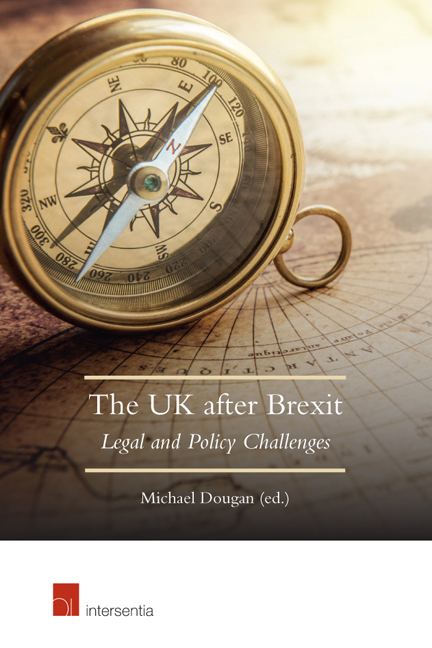Book contents
- Frontmatter
- Contents
- List of Authors
- Editor's Introduction
- Part I Constitutional Issues
- Part II Substantive Policies
- Part III External Relations
- Chapter 11 Membership of the World Trade Organization
- Chapter 12 UK Trade Policy
- Chapter 13 UK Foreign Investment Protection Policy Post-Brexit
- Chapter 14 Brexit and International Peace and Security: A Crisis for Crisis Management?
- Chapter 15 Brexit and Relations between the EU and the UK
- About the Editor
Chapter 13 - UK Foreign Investment Protection Policy Post-Brexit
from Part III - External Relations
Published online by Cambridge University Press: 13 October 2018
- Frontmatter
- Contents
- List of Authors
- Editor's Introduction
- Part I Constitutional Issues
- Part II Substantive Policies
- Part III External Relations
- Chapter 11 Membership of the World Trade Organization
- Chapter 12 UK Trade Policy
- Chapter 13 UK Foreign Investment Protection Policy Post-Brexit
- Chapter 14 Brexit and International Peace and Security: A Crisis for Crisis Management?
- Chapter 15 Brexit and Relations between the EU and the UK
- About the Editor
Summary
INTRODUCTION
The debate about the future of UK foreign economic relations post-Brexit has so far been dominated by issues of global trade. However, despite having so far attracted relatively limited attention in political and legal discourse, the development of UK foreign investment policy remains a tremendously important issue, not least because of the scale of the UK's existing investment treaty commitments. Prior to the transfer of competence over foreign investment to the EU in 2010, the UK concluded at least 106 bilateral investment treaties and 75 treaties with investment provisions (most of the latter signed by the EC and subsequently the EU). There is also a strong likelihood of investment promotion and protection rules being included in future UK trade agreements both with the EU and with third states, including the eagerly anticipated free trade deals with the United States, Australia and India. Furthermore, the UK Government's economic priorities, as articulated in its recent policy documents, suggest that inward foreign investment is expected to play a key part in governmental efforts to foster economic growth aft er the country withdraws from the EU. ‘UK plc’ is open for business, but what does that mean from the point of view of international investment law?
This chapter will focus on three key areas which are not only of fundamental importance to the UK as both a recipient and exporter of investment, but are also likely to pose challenges to policy-makers in formulating the country's future priorities in the field of foreign investment promotion and protection. These key areas include (1) the content of commitments to be incorporated in UK investment agreements with the EU and other countries around the globe; (2) the telos, or object and purpose, of future UK investment agreements; and (3) the process of draft ing, negotiating and concluding UK investment agreements. This chapter does not aim to provide a comprehensive analysis of UK investment treaty policy but rather seeks to highlight some of the most contentious overarching issues and challenges that policy-makers would need to address aft er reclaiming competence over investment issues from Brussels.
- Type
- Chapter
- Information
- The UK after BrexitLegal and Policy Challenges, pp. 267 - 286Publisher: IntersentiaPrint publication year: 2017

